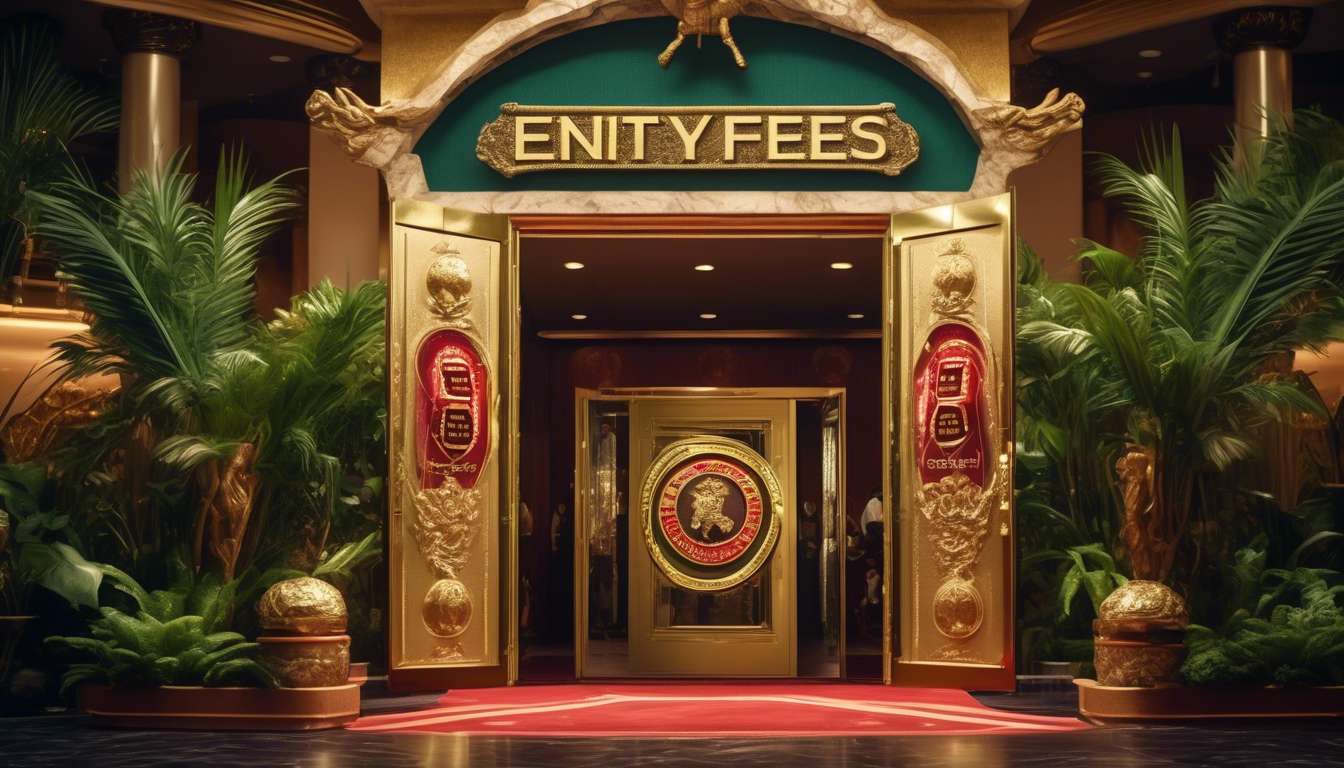As we gather our thoughts and reflect on the recent developments in the Philippines’ gaming industry, we find ourselves at a pivotal moment. A new bill is under consideration that could reshape the entry landscape for casinos across the nation. This proposed legislation aims to introduce an entry fee for those wishing to partake in the vibrant world of Philippine casinos.
As avid observers of the industry, we recognize the potential impact this could have on both patrons and operators alike.
On one hand, it could serve as a deterrent to impulsive gambling, promoting a more responsible gaming environment.
On the other, it may influence the accessibility and allure that casinos currently offer to a diverse clientele.
As we delve deeper into this topic, we aim to:
- Explore the motivations behind this legislative move.
- Assess its possible implications.
- Contemplate how it might redefine the casino experience in the Philippines.
By understanding these aspects, we can better appreciate the potential transformation that this bill could bring to the Philippine gaming industry.
Background of the Proposed Bill
The proposed bill aims to introduce entry fees for casinos in the Philippines to regulate local patronage and address gambling-related issues.
As a community, we recognize the need for effective gambling regulation that ensures our loved ones are protected while maintaining the vibrant energy that casinos bring to our economy. By implementing casino entry fees, we’re taking a step forward in creating a balanced environment where entertainment doesn’t come at the cost of our community’s well-being.
We’ve seen how unchecked gambling can lead to negative repercussions, not just for individuals but for families and our society as a whole. The economic impact of this bill could be significant:
- Introducing entry fees is expected to generate additional revenue, which can be reinvested into local services that benefit us all.
- By curbing impulsive visits, we’re fostering a more responsible gambling culture.
Together, we’re striving to create a safe, inclusive space where everyone can enjoy the thrill of casinos responsibly.
The Impact on Gambling Behavior
We anticipate that implementing entry fees will notably reduce spontaneous gambling trips, encouraging more thoughtful and deliberate participation. This shift could foster a sense of community among those who view gambling as an occasional entertainment rather than an impulsive habit.
Casino entry fees serve as a form of gambling regulation, potentially curbing excessive gambling by making people think twice before entering. By introducing a financial barrier, we’re likely to see a decrease in casual visits, which may lead to a healthier gambling environment.
This regulation could also have a positive economic impact by generating additional revenue for social programs and infrastructure, benefiting us all. It creates a shared responsibility to support the community while indulging in leisure activities.
As we embrace this change together, we find ourselves part of a collective effort to promote responsible gambling. Through thoughtful participation, we can enjoy the thrill of gaming while ensuring a positive impact on our society.
Comparison to International Practices
Many countries have implemented entry fees for casinos as a strategy to promote responsible gambling and generate additional revenues. By exploring international practices, we can better understand the potential benefits and challenges of this approach.
In places like Singapore and Macau, casino entry fees have become a standard part of gambling regulation. They aim to:
- Curb excessive gambling
- Encourage mindful spending
- Align with social responsibility goals
Balancing economic impact with social welfare is a common theme in these examples. Casino entry fees are not just about revenue; they’re about fostering a healthy gambling environment. By requiring visitors to pay, these fees can:
- Act as a deterrent for impulsive gamblers
- Ensure that those who enter are more likely to gamble responsibly
We can draw inspiration from such models, adapting them to fit our unique cultural and economic landscape. As we consider implementing similar measures, it’s crucial to ensure our approach resonates with our community’s values and needs.
Potential Revenue Generation
By implementing entry fees, we could significantly boost government revenue while also promoting responsible gambling practices.
Casino entry fees serve as a strategic tool in gambling regulation, offering a dual benefit:
-
Revenue Generation:
- They generate a steady stream of income for government programs and initiatives.
- This revenue can support essential public services, creating a sense of shared prosperity and community well-being.
-
Promotion of Responsible Gambling:
- These fees encourage responsible gambling by acting as a deterrent to impulsive visits.
- They foster a healthier gaming culture, reducing the likelihood of problem gambling.
Moreover, the economic impact of instituting entry fees extends beyond direct revenue.
- It can create a ripple effect, stimulating sectors like tourism and hospitality, as visitors plan more intentional casino visits.
By aligning our approach with successful international practices, we can ensure a balanced, sustainable economic growth that benefits us all.
Concerns of Industry Stakeholders
Many stakeholders in the casino industry express concerns about the potential negative impact of entry fees on customer footfall and overall revenue.
Key Concerns:
- Casino entry fees could deter casual visitors, reducing the influx of new patrons.
- This reduction might affect our ability to foster a vibrant community, which is crucial for a thriving industry.
Furthermore, as we navigate these proposed gambling regulations, we need to recognize that a decrease in foot traffic could lead to a broader economic impact, affecting not only casinos but also surrounding businesses that rely on casino visitors.
Potential Economic Impact:
- Restaurants
- Hotels
- Local attractions
These businesses could face decreased patronage, creating a ripple effect throughout our community.
We’re all part of a network that thrives on connection and shared experiences. As stakeholders, it’s important for us to voice our concerns and work collectively to ensure that any new regulations balance the need for responsible gambling with the economic vitality of our industry and community.
Social and Economic Ramifications
We must consider how these changes might reshape our community’s social dynamics and economic landscape.
Social Impact:Introducing casino entry fees could alter the way we interact with gambling. This step might:
- Reduce impulsive visits.
- Encourage more thoughtful participation.
This change in gambling regulation aims to foster a more responsible gambling culture, inviting us to reflect on how we spend our leisure time and money.
Economic Impact:The impact of casino entry fees could be multifaceted.
-
Potential Negative Effects:
- These fees might deter casual visitors.
- A decrease in foot traffic could affect related businesses like restaurants and hotels.
-
Potential Positive Effects:
- Collected fees could generate significant revenue.
- This revenue might fund community projects or social services, benefiting us all.
It’s crucial that we weigh these potential outcomes carefully. While the economic impact might initially strain certain sectors, it could also lead to long-term benefits for our community.
Conclusion:Together, we can navigate these changes, ensuring that our shared values and goals remain intact.
Enforcement and Compliance Challenges
We face numerous challenges in ensuring compliance with the new casino entry fee regulations. As a community invested in responsible gambling regulation, it is imperative to address issues such as enforcement consistency and the potential for evasion.
Implementation and Monitoring:
- It’s crucial that everyone involved understands how these fees will be implemented and monitored.
- We aim to create a system that’s fair and transparent, ensuring that casino operators and patrons alike can easily navigate the requirements.
Strategies to Tackle Challenges:
-
Establish Clear Guidelines:
- Develop comprehensive rules that are easy to understand and follow.
-
Foster Collaboration:
- Encourage cooperation among regulatory bodies, casino operators, and patrons to ensure smooth compliance.
-
Minimize Economic Impact:
- Implement strategies that reduce any negative economic consequences stemming from the new regulations.
Education and Awareness:
- We recognize the importance of educating stakeholders about the benefits of casino entry fees.
- These fees help promote responsible gambling and generate revenue for essential public services.
Community Commitment:
Together, we can build a regulatory framework that not only promotes compliance but also strengthens our community’s commitment to responsible gambling practices. By addressing these key areas, we ensure a more effective and sustainable approach to casino regulations.
Public Perception and Reception
Many people are curious about how the public will perceive and react to the introduction of entry fees at casinos. As we navigate these changes, it’s important to consider how these fees might shape our community’s relationship with gambling.
Some of us might see this as a positive step towards more responsible gambling regulation, potentially reducing impulsive visits and promoting a healthier gaming environment.
Others might worry about the economic impact, arguing that these fees could deter tourists and locals alike, potentially affecting local businesses that depend on casino traffic.
We must also consider how these fees might influence our collective sense of belonging within these entertainment spaces.
- Will it create an exclusive atmosphere?
- Or encourage a more balanced approach to leisure and spending?
The conversation around this policy is just beginning, and as a community, we should engage in open dialogue. Let’s ensure that our voices are heard in shaping a future that reflects our shared values and aspirations.
Conclusion
In conclusion, the Philippines bill to charge fees before entering casinos aims to reshape gambling norms and boost revenue.
While it may deter casual gamblers, the potential impact on addiction rates and industry dynamics remains uncertain. International parallels suggest mixed outcomes, raising concerns among stakeholders.
Key considerations for the bill’s success include:
- Enforcement and compliance hurdles that must be navigated carefully.
- The overall public perception and reception, which are critical factors in shaping the bill’s success in the gambling landscape.
The effectiveness of this initiative will depend significantly on how these aspects are addressed.




